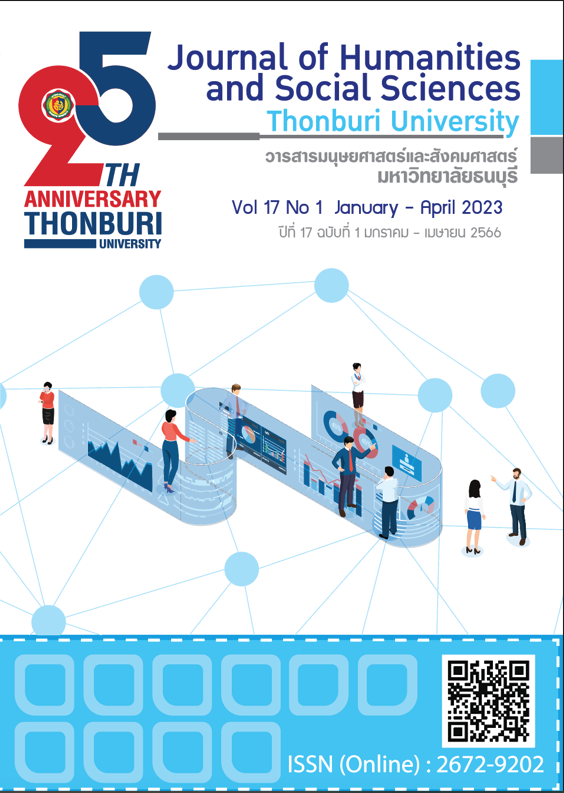The The Influence of Technology Acceptance Factors on Intention to Study via Online Learning Behavior between Generation Y and Z Individuals in Bangkok
Keywords:
Technology Acceptance Factors, Generation Y, Generation Z, Intention to Study OnlineAbstract
The purpose of the research study was to compare the influence of technology acceptance factors on the intention to study via online learning behavior between Generation Y and Z individuals in Bangkok during the COVID 19 pandemic. In this study, 275 samples of students in generations Z and Y were used. The research instrument, which included a total of 30 items and a Cronbach's alpha coefficient of 0.9, was used for data collection. The relationship between performance expectancy, effort expectancy, social influence, and facilitating conditions affecting intention to study via online learning behaviors of students in the Bangkok. The study was examined using a hierarchical regression analysis to investigate the moderating effect of generation. The results showed that the younger generation perceived performance expectancy and effort expectancy as being higher than those of the older generation. Educational management should ensure that messages about the performance advantages of online study and the suitability of the online system are well received by the young targets to increase their intention to study online. At the same time, social influence and facilitating conditions should be standardized and well received by both generations.
References
Abdullah, F., & Ward, R. (2016). Developing a General Extended Technology Acceptance Model for E-Learning (GETAMEL) by analysing commonly used external factors. Computers in human behavior, 56, 238-256.
Chaiyakulwat, N. (2017). Application of the combined theory of adoption and use of technology to understand the acceptance of the investment community as if booking for retail investors. Independent research. Master of Business Administration, Bangkok University.
Fernquest, J. (2016). Generation Y Thailand: A new Me Generation? Retrieved February 24, 2021, from Bangkok Post: https://www.bangkokpost.com/learning/advanced/1038478/generation-y-thailand-a-new-me-generation-.
Ferrari, P. (2018). Generation Z-ers are coming of age and bringing. Retrieved February 24, 2021, from https://www.capstan.be/generation-z-ers-are-coming-ofage-age-and-bringing-fresh-challenges-to-educators.
Hair, J. F., Black, W. C., Babin, B. J., & Anderson, R. E. (2018). Multivariate data analysis: a global perspective (7th ed.). New York: Pearson.
Joa, C. Y., & Magsamen-Conrad, K. (2021). Social influence and UTAUT in predicting digital immigrants’ technology use. Behaviour & Information Technology, 1-19.
Khechine, H., & Augier, M. (2019). Adoption of a social learning platform in higher education: an extended UTAUT model implementation. In Proceedings of the 52nd Hawaii International Conference on System Sciences. 53-62.
Khechine, H., & Lakhal, S. (2018). Technology as a Double-edged Sword: From Behavior Prediction with UTAUT to Students' Outcomes Considering Personal Characteristics. Journal of Information Technology Education, 17, 63-102.
Khechine, H., Lakhal, S., Pascot, D., & Bytha, A. (2014). UTAUT model for blended learning: The role of gender and age in the intention to use webinars. Interdisciplinary Journal of E-Learning and Learning Objects, 10(1), 33-52.
KTC Academy. (2018). Course on Knowing and Understanding Working Style with Gen Y and Gen Z (Understanding Gen Y and Gen Z Working Style). Retrieved February 24, 2021, from KCT Academy: https://kctathailand.com/courses/courses-know-understand style/.
Li, C., & Lalani, F. (2020). The COVID-19 pandemic has changed education forever: This is how. Retrieved February 23, 2021, from World Economic forum: https://www.weforum.org/agenda/2020/04/coronavirus-education-global-covid19-online-digital-learning/.
Lin, P. C., Lu, H. K., & Liu, S. C. (2013). Towards an Education Behavioral Intention Model for e-learning Systems: An Extension of UTAUT. Journal of Theoretical & Applied Information Technology, 47(3)., 47(3).
Mardikyan, S., Besiroglu, B., & Uzmaya, G. (2021). Behavioral intention towards the use of 3G technology. Communications of the IBIMA, 1.
National Statistical Office. (2019). Demographic statistics Population and housing. Retrieved February 26, 2021, from NESDB: http://statbbi.nso.go.th/staticreport/page/sector/th/01.aspx
Persada, S. F., Miraja, B. A., & Nadlifatin, R. (2019). Understanding the generation Z behavior on D-learning: A Unified Theory of Acceptance and Use of Technology (UTAUT) approach. International Journal of Emerging Technologies in Learning (iJET), 14(5), 20-33.
Phakdichakriwut, Y. (2020). Covid-19 accelerates 'education' in Thailand until it's time to change? Retrieved February 25, 2021, from Bangkok Business:: https://www.bangkokbiznews.com/news/detail/885550.
Postolov, K., Magdinceva Sopova, M., & Janeska Iliev, A. (2017). E-learning in the hands of generation Y and Z. Poslovna izvrsnost, 11(2), 107-119.
Purwanto, E., & Loisa, J. (2020). The intention and use behaviour of the mobile banking system in Indonesia: UTAUT Model. Technology Reports of Kansai University, 62(06), 2757-2767.
Setchinda, T., & Mimacha, K. (2019). Factors Influencing Consequences of Consequently Using Telephone Banking Services: Case studies of service users in Bangkok. RMUTT Global Business and Economics Review, 14(1), 117-138.
Tan, P. B. (2013). Applying the UTAUT to understand factors affecting the use of English e-learning websites in Taiwan. Sage Open, 3(4).
Techakritteerapong, W., & Inthuchhanyong, S. (2016). Factors for accepting the use of collaboration technology among personnel in organizations in Thailand. Journal of Business Administration, 39(152), 30-44.
Vanichanan, P. (2020). Basic education in the Covid-19 era: how to open and close schools? Retrieved February 23, 2021, from TDRI: https://tdri.or.th/2020/05/basic-education-in-covid-19-crisis-reopening-school-after-lockdown/.
Venkatesh, V., Morris, M. G., Davis, G. B., & David, F. D. (2003). User acceptance of information technology: Toward a unified view. MIS quarterly, 425-478.
Yousafzai, S. Y., Foxall, G. R., & Pallister, J. G. (2007). Technology acceptance: a meta‐analysis of the TAM: Part 1. Journal of Modelling in Management.
Downloads
Published
How to Cite
Issue
Section
License
Copyright (c) 2022 Watit Intuluck

This work is licensed under a Creative Commons Attribution-NonCommercial-NoDerivatives 4.0 International License.
ผลงานที่ปรากฎในวารสารฉบับนี้เป็นลิขสิทธิ์เฉพาะส่วนบุคคลของผู้เขียนซึ่งต้องรับผิดชอบต่อผลทาง กฎหมายที่อาจเกิดขึ้นได้และไม่มีผลต่อกองบรรณาธิการ






